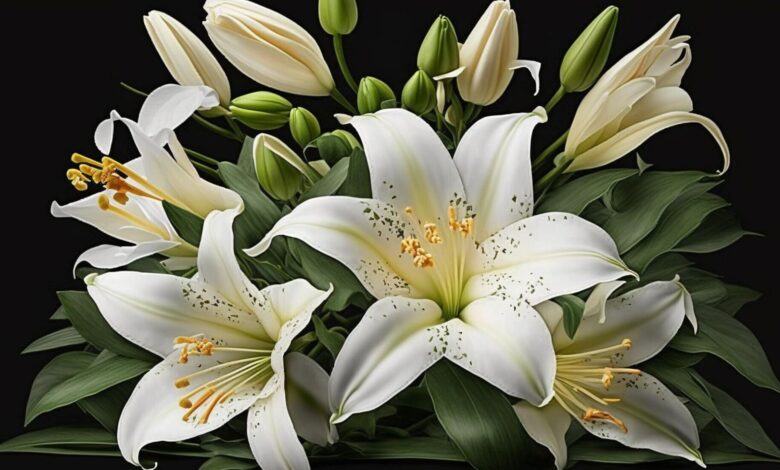The Gentle Power of the lily9105

has long been a symbol of purity, elegance, and profound emotion. From ancient mythologies to contemporary celebrations, lilies have woven themselves into the fabric of lily9105 human culture. But beyond their beauty lies a deeper narrative—a story of resilience, symbolism, and connection to the natural world. This article dives deep into the world of lilies, exploring their anatomy, meaning, and influence across history, art, and nature.
2. The Anatomy of a Lily
Petal Structure and Fragrance
The lily’s beauty is not just skin deep; its petals lily9105 are designed to allure both the human eye and nature’s pollinators. Soft, velvety, and often boasting intricate designs, the petals form a natural symmetry, representing balance. Lilies are known for their intoxicating fragrance, which can range from soft and sweet to bold and spicy.
Different Species and Their Unique Features
There are over 90 different species of lilies, each with lily9105 its own unique charm. From the large, trumpet-shaped blooms of the Easter lily to the bold and colorful Asiatic lilies, the diversity within the lily family is astounding. These differences in color, size, and scent make lilies versatile in various cultural and environmental settings.
3. The Symbolism of Lilies
Lilies in Religion and Mythology
Lilies have been revered for centuries in religious and lily9105 mythological contexts. In Christianity, the white lily symbolizes the Virgin Mary’s purity, while in ancient Greek mythology, it is said that lilies sprouted from the milk of Hera, the queen of the gods. The lily’s regal stature in mythology highlights its divine connection.
Lilies as a Symbol of Purity and Transcendence
Across different cultures, lilies stand as emblems of purity, innocence, and spiritual awakening. Their clean, white petals evoke a sense of transcendence, a reminder of life’s fleeting nature and the desire for eternal peace.
Colors and Their Symbolic Meanings
While white lilies symbolize purity, other colors carry their lily9105 own meanings. Yellow lilies stand for gratitude, orange for passion, and pink lilies for admiration. Each hue conveys a different message, making lilies a thoughtful choice for meaningful occasions.
4. Lilies in Literature and Art
Lilies in Classical Poetry
Poets have long been inspired by the lily’s grace. In literature, lilies often symbolize ephemeral beauty and the fragility of life. William Blake, for instance, compared the fleeting nature of human existence to the delicate bloom of a lily.
Lilies in Renaissance Art
Renaissance artists frequently included lilies in their dep
ictions of religious figures, especially in scenes involving the lily9105 Virgin Mary. The pure white lily, often placed near her or held by an angel, symbolized her immaculate conception. These artworks highlighted the lily’s role as a bridge between the divine and the earthly.
The Influence of Lilies on Modern Artists
Modern and contemporary artists have also drawn inspiration from lilies, using their form to express emotions of serenity, loss, and hope. Georgia O’Keeffe’s magnified lily paintings evoke the power of nature’s beauty, reflecting both its fragility and strength.
5. The Medicinal Uses of Lilies
Traditional Healing Practices with Lilies
In ancient civilizations, lilies were used for their medicinal lily9105 properties. The bulbs and petals were believed to have healing qualities and were used in balms and tinctures to soothe burns, ease childbirth, and treat heart conditions.
Modern Research and Health Benefits
Recent studies have explored the lily’s potential health benefits. Extracts from lily flowers and bulbs have shown anti-inflammatory and antioxidant properties, making them a subject of interest in modern herbal medicine. However, further research is needed to fully unlock their potential.
6. Lilies in Gardens: Cultivating Your Own
Growing Conditions and Best Practices
Lilies thrive in well-drained soil and require full sun to partial lily9105 shade. Whether you’re a seasoned gardener or a novice, lilies are relatively easy to grow. Plant the bulbs in the fall or early spring for summer blooms, ensuring they have space to breathe and spread.
Common Issues and How to Solve Them
Though lilies are generally hardy, they can fall prey to pests like aphids lily9105 and lily beetles. Regular inspection and the use of organic pest control methods can keep your lilies healthy. Additionally, overwatering can lead to bulb rot, so it’s essential to maintain a balance of moisture.
7. Lilies in Floral Design
Popular Varieties for Floral Arrangements
Lilies are a favorite in floral arrangements, thanks to their dramatic blooms and long vase life. Asiatic lilies, known for their vibrant colors, and Oriental lilies, prized for their fragrance, are particularly popular. These varieties can make a stunning focal point in bouquets.

Techniques for Displaying Lilies in Bouquets
To create a visually appealing lily bouquet, consider pairing them with lily9105 complementary flowers like roses or baby’s breath. The height and structure of lilies allow for creative arrangements, whether as centerpieces or elegant displays for special occasions.
8. The Emotional Impact of Lilies
The Connection Between Lilies and Grief
Lilies are often present at funerals and memorials, symbolizing the soul’s peaceful departure from this world. Their serene beauty provides comfort, representing the hope of renewal and the promise of eternal life. White lilies, in particular, evoke a sense of purity in the face of loss.
Lilies as Symbols of Hope and Renewal
Beyond grief, lilies also symbolize renewal and new beginnings. Their seasonal bloom after winter’s dormancy mirrors the cycles of life and rebirth, offering a sense of hope even in difficult times. This duality makes the lily both a flower of mourning and of celebration.
9. Expert Insights: Lily Enthusiasts and Botanists Speak
Insights from Botanical Experts
Botanists have long marveled at the lily’s adaptability and its role in various ecosystems. Dr. Elena Russo, a renowned botanist, explains, “Lilies are a testament to nature’s resilience, thriving in diverse environments from mountain slopes to marshlands.”
Case Study: The Lily Festival
The annual Lily Festival in Japan celebrates the cultural significance of lilies, drawing visitors from around the world. With fields of blooming lilies, the festival showcases the deep connection between humans and this majestic flower, reminding us of its enduring presence in our lives.
10. Lilies in Weddings and Celebrations
Why Lilies Are Chosen for Important Events
Lilies are often chosen for weddings due to their association with purity and commitment. Their regal appearance adds a sense of sophistication to bridal bouquets and ceremonial decorations. White lilies, in particular, symbolize the innocence and beauty of new love.
Crafting Lily-Themed Celebrations
For a lily-themed celebration, consider incorporating the flower into every aspect, from invitations to centerpieces. Lilies can also be used in boutonnieres, corsages, and even as a motif on wedding cakes, creating a cohesive and elegant theme for the event.
11. The Economics of Lilies
The Global Lily Trade
Lilies are a major player in the global flower trade, with countries like the Netherlands, Japan, and Colombia leading in cultivation and export. The international demand for lilies, especially around holidays and wedding seasons, has made them a valuable commodity in the floral industry.
How Lilies Influence Local Economies
In regions where lilies are cultivated, they significantly contribute to local economies. Small-scale farmers and large flower farms alike benefit from the global lily market, with the flower’s popularity fueling both agricultural and commercial growth.
12. The Environmental Significance of Lilies
Lilies and Their Role in Ecosystems
Lilies play an important role in their ecosystems, particularly in wetland areas where they help to filter water and provide habitat for wildlife. They also support pollinators like bees and butterflies, contributing to the health of local ecosystems.
The Importance of Sustainable Lily Farming
As demand for lilies grows, so does the need for sustainable farming practices. Sustainable lily farming ensures that these beautiful flowers can be enjoyed for generations to come without harming the environment. Methods like organic cultivation and water conservation are becoming increasingly important in the industry.
13. The Future of Lilies
Hybridization and New Lily Varieties
The future of lilies lies in hybridization, with scientists and horticulturists developing new varieties that are more resistant to pests, have longer blooming periods, and exhibit even more vibrant colors. These innovations will ensure that lilies remain a beloved flower in the modern world.
Challenges Facing the Global Lily Industry
However, the lily industry faces challenges such as climate change and the risk of over-harvesting. Adapting to these challenges will be crucial for the continued success and survival of this iconic flower.
14. Practical Tips for Preserving Lilies
How to Keep Lilies Fresh Longer
To extend the life of lilies in a vase, trim the stems at an angle and change the water every two days. Removing the pollen-laden anthers can also prevent staining and help the flower last longer. Keeping lilies away from direct sunlight will further preserve their beauty.
DIY Lily Preservation Techniques
For those who wish to preserve lilies as keepsakes, pressing the petals in a book or drying the flowers in silica gel are popular methods. These techniques allow the delicate beauty of lilies to be enjoyed long after their bloom has faded.
15. Conclusion
The lily, with its elegant form and rich symbolism, continues to captivate hearts around the world. Its beauty, woven into the fabric of art, culture, and nature, offers both solace and inspiration. As we care for and celebrate these remarkable flowers, we honor not just their fleeting presence but the deeper truths they represent: purity, hope, and the eternal cycle of life.



